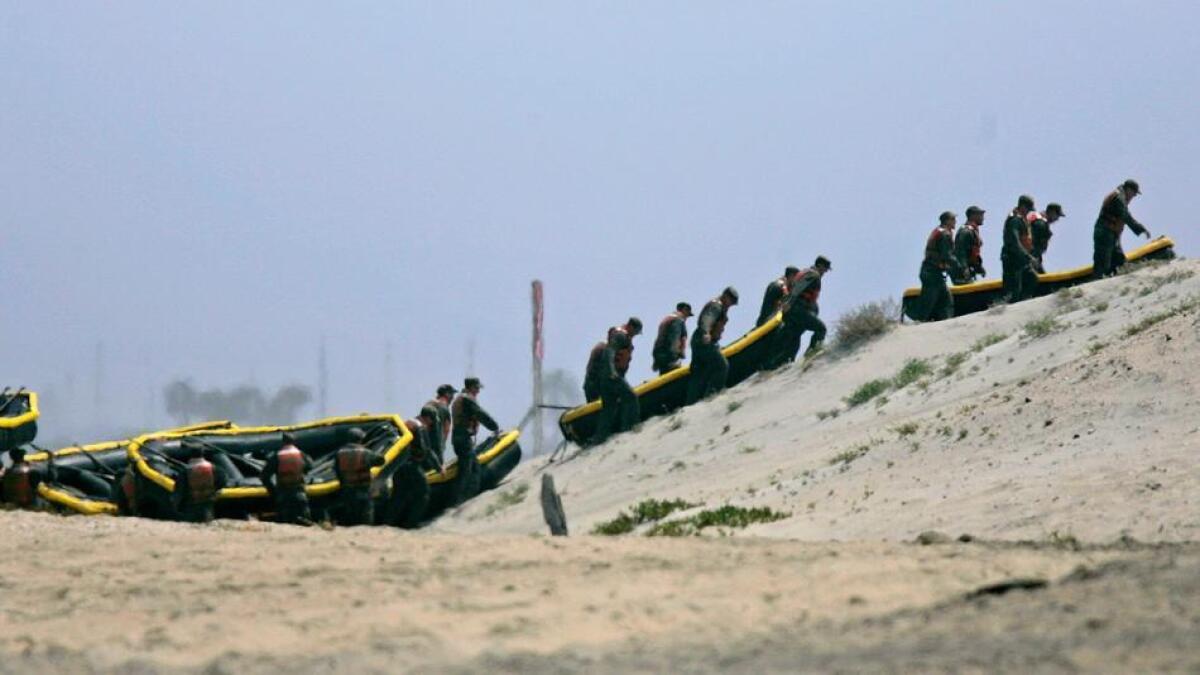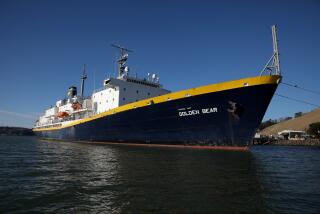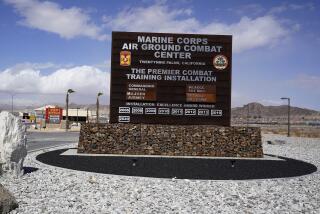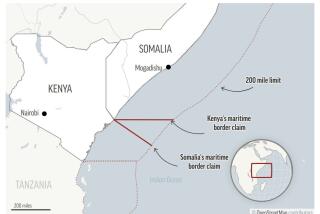Investigations underway after Navy SEAL candidate slapped during training ends up in coma

Reporting from San Diego — Twin investigations are underway into an incident at the Naval Special Warfare training complex in Coronado that left one Navy SEAL candidate in a coma.
Authorities said that Naval Criminal Investigative Service agents and members of the Naval Special Warfare Center in Coronado are reviewing an Oct. 12 mishap that occurred during a study session for the land navigation course of the Basic Under Water Demolition/SEAL training program, or BUD/S.
As an incentive to correctly answer questions, two sailors reportedly agreed to slap whichever one got a response wrong. BUD/S candidates typically challenge each other to perform acts of physical exertion, such as pushups, because striking another student is forbidden.
One of the candidates reportedly reeled from a slap and fell to the floor, striking his head. He was rushed to Naval Medical Center San Diego, where surgeons placed him in a medically induced coma to help heal what SEAL spokesman Lt. Trevor Davids said was an unintentional injury.
“The staff on site immediately rendered medical attention and quickly transported the injured student to the hospital,” Davids said in a written statement. “He is currently in good condition and recovering; we continue to provide all the necessary support to our student and his family.
“Naval Special Warfare Center takes any injury during training extremely seriously and in response is conducting a thorough investigation into this matter. [The center] trains elite maritime special operators in a professional and dignified training environment. Actions which fall short of this high standard are not tolerated.”
The center declined to name either the BUD/S students or the SEAL instructor who was in the classroom at the time.
The Center’s investigation began immediately after the incident. NCIS spokesman Ed Buice said his agency started its inquiry the following morning.
“There’s no timetable for completion; each case is unique and moves at its own pace,” Buice said by email. “NCIS is a fact-finding entity; it will be up to the convening authority to determine whether charges should be filed.”
Land navigation instruction usually takes place in the third phase of the six-month BUD/S training program in the Laguna Mountains east of San Diego. Candidates learn how to read maps, plot coordinates and traverse many types of terrain. Students often study training materials before the course begins.
The SEALs began investigating the incident on the very day the Navy announced it finally closed the case of the 2016 drowning death of SEAL candidate James Derek Lovelace.
The 15-month probe ended after investigators for the U.S. attorney’s office in San Diego decided to forgo prosecution of the unnamed SEAL instructors who were present during his death.
Lovelace died on May 6, 2016, during the combat swimmer orientation, a test that takes place in the first week of BUD/S to assess a student’s swimming abilities.
Candidates tread water and perform ocean survival skills, including removal of a swim mask, uniform and boots.
The San Diego County medical examiner ruled the 21-year-old sailor’s death a homicide, saying in an autopsy report that the “actions, or inactions, of the instructors and other individuals involved were excessive and directly contributed to the death.”
One unidentified SEAL instructor repeatedly dunked Lovelace during the test, but the Florida sailor’s death was exacerbated by an anomalous coronary artery, a heart condition that might have triggered sudden cardiac death during the intensive exercise.
Navy leaders long contended that the medical examiner’s homicide ruling meant only that Lovelace died “at the hands of another” and did not necessarily suggest a crime occurred, a perspective shared by multiple military commanders all the way to the Pentagon and then by civilian federal prosecutors last month.
Even without judicial action against Lovelace’s instructors, however, the SEALs instituted what they said were wide-ranging reforms designed to make training safer at the Coronado complex.
Naval Special Warfare Basic Training Command temporarily halted the entire BUD/S program after the drowning to review and reinforce protocols for pre-training briefs, emergency action and in-water instruction procedures, Navy officials said.
It’s unclear whether those reforms should have prevented the Oct. 12 incident, pending investigations.
Even if NCIS agents rule the latest mishap an accident and commanders decline court-martial prosecution or nonjudicial punishment proceedings, the Navy has other means of addressing possible wrongdoing uncovered by investigators.
Naval Special Warfare can convene an administrative board to strip the instructor of his coveted SEAL trident. Commanders also can issue formal or informal reprimands or counseling statements to the sailors involved in the mishap, stalling a sailor’s promotion to higher rank.
Prine writes for the San Diego Union-Tribune.
More to Read
Sign up for Essential California
The most important California stories and recommendations in your inbox every morning.
You may occasionally receive promotional content from the Los Angeles Times.










